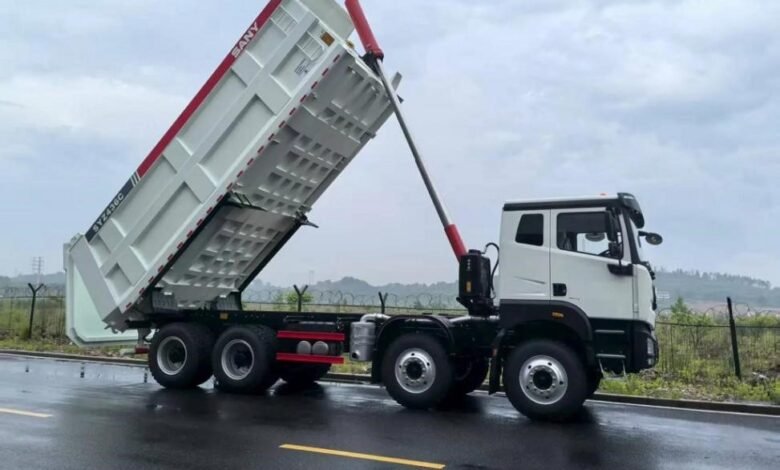Which Dump Truck Features Maximize Job-Site Efficiency?

Optimizing job-site productivity demands more than just manpower; it hinges significantly on the machinery in use. Dump trucks play a critical role in this process with features that can dramatically influence efficiency. From load-handling capacities to cutting-edge technology, understanding what makes a dump truck efficient is crucial. Construction managers and operators who are well-informed about these features can make better choices, ensuring that projects run smoothly, on time, and within budget. This guide will delve into the essential dump truck features that contribute to job-site efficiency, focusing on load handling, durability, safety, and technology. Equip yourself with this knowledge to enhance productivity and cost control in your construction endeavors.
Load-Handling Features That Drive Efficiency
High Payload & Optimal Body Volume
High payload capacity and optimal body volume are crucial for a dump truck’s efficiency. A truck designed to carry more material in one trip directly impacts project timelines, reducing the number of trips required and thus saving fuel. The body design matters too; a well-configured shape ensures maximum usage of space. Consider the material type during selection—aggregates, for instance, need different considerations compared to loose soil. Matching a truck’s volume capacity to material density can prevent overloading and improve efficiency. Construction projects must account for these load-handling features to optimize operational cost and efficiency.
Efficient Unloading Design
An efficient unloading design is pivotal for job-site productivity. Time lost during unloading operations can accumulate, delaying projects. Hydraulic systems that allow for quick, controlled dump actions can mitigate this issue. Tippers with smooth interior linings prevent materials from sticking, ensuring a clean release each time. Side and rear tipper configurations offer flexibility in how and where materials are deposited, minimizing repositioning. These design features streamline operations, reducing downtime and labor costs. By prioritizing efficient unloading mechanisms when choosing dump trucks, construction managers can significantly cut down on time wastage and enhance operational flow.
Durability & Terrain-Ready Features
Robust Chassis and Heavy-Duty Axles
A robust chassis and heavy-duty axles define a dump truck’s durability, essential for enduring the rigors of construction sites. These components are critical in supporting the vehicle’s weight and maintaining structural integrity over rough terrains. Reinforced steel frames and high-tensile axles absorb the stress of loading and unloading, minimizing wear and tear. Continuous use on uneven surfaces can be challenging, but durable construction ensures longevity and reliability. Selecting trucks with these robust features will allow them to sustain heavy loads over time, reducing maintenance costs and preventing operational delays caused by mechanical failures.
Terrain Adaptability & Mobility
Terrain adaptability and mobility are key features that enable dump trucks to perform efficiently on diverse job sites. Construction sites vary widely, with different challenges ranging from muddy grounds to steep inclines. Trucks equipped with all-wheel drive and advanced suspension systems tackle these challenges effectively. Tires designed for off-road conditions further enhance grip and stability. Furthermore, trucks with adjustable ground clearance can navigate obstacles without damage. Choosing vehicles that excel in terrain adaptability means fewer delays and increased safety on-site. Equip your fleet with trucks designed for versatile terrain handling to improve site efficiency.

Operator, Safety & Tech Features
Driver Comfort and Control Systems
Driver comfort and effective control systems are paramount for maintaining efficiency and safety. An ergonomically designed cabin reduces fatigue, whereas intuitive controls enhance operational accuracy. Features such as climate control, adjustable seating, and sound insulation contribute to a pleasant working environment, keeping drivers alert and focused. Advanced controls, like joystick steering and automated gearboxes, simplify operation, allowing drivers to concentrate on maneuvering. Comfortable and intuitive setups not only boost productivity but also maximize driver satisfaction and retention, ultimately benefiting construction timelines and outcomes.
Safety & Advanced Features
Safety is non-negotiable in construction. Trucks equipped with advanced safety features protect both operators and site workers. Collision avoidance systems, lane departure warnings, and external cameras significantly reduce accidents. Anti-lock braking systems (ABS) provide better control over stopping, even on slippery surfaces. Automated stability programs prevent rollovers by adjusting braking pressure and engine speed. Safety is enhanced further with features like high-visibility lighting and warning signals. Investing in trucks with cutting-edge safety features ensures compliance with regulations and fosters a safe working environment that prioritizes human life.
Telematics, Fuel Monitoring & Intelligent Systems
Modern dump trucks harness telematics, fuel monitoring, and intelligent systems to enhance operational efficiency. Telematics captures data on vehicle performance and location, enabling managers to optimize fleet usage and minimize downtime. Real-time fuel monitoring aids in tracking consumption, identifying inefficient driving patterns, and implementing corrective measures. Intelligent systems can automate routine tasks, reducing human error. These technologies provide insights that facilitate informed decision-making and strategic planning. By embracing tech innovations in fleet management, construction projects can achieve better productivity and cost management, paving the way for successful outcomes.
Conclusion
Investing in dump trucks with features that enhance job-site efficiency is a strategic decision with significant implications. By prioritizing load-handling capabilities, durability, and advanced tech systems, construction managers can streamline operations and maximize productivity. Safety features not only protect workers but also improve regulatory compliance, while driver comfort reduces fatigue and improves focus. Leveraging telematics and intelligent systems empowers managers to harness data for improved decision-making. As the construction industry evolves, understanding and implementing these key dump truck features become indispensable for competitive, efficient, and successful project execution.




